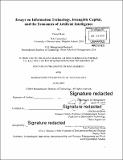Essays on information technology, intangible capital, and the economics of artificial intelligence
Author(s)
Rock, Daniel Ian.
Download1135802300-MIT.pdf (22.25Mb)
Other Contributors
Sloan School of Management.
Advisor
Erik Brynjolfsson.
Erik Brynjolfsson.
Terms of use
Metadata
Show full item recordAbstract
This dissertation contains four essays concerning the economics of information technology, intangible capital, and artificial intelligence. In the first essay, "Engineering Value: The Returns to Technological Talent and Investments in Artificial Intelligence" I describe how firms can appropriate some of the value of their employees' human capital by assigning firm-specific tasks. I then use a database of employment records to document dynamics in the valuation of publicly traded firms as they relate to different types of employment, focusing especially on AI skills. The second essay, "The Productivity J-Curve: How Intangibles Complement General Purpose Technologies" (coauthored with Erik Brynjolfsson and Chad Syverson) addresses the concern that new technologies with wide applicability throughout the economy can cause both underestimation and overestimation of total factor productivity. As capital is accumulated, intangible investment output, and therefore productivity growth, will be underestimated only to later generate a yield (at which point productivity growth will be overestimated). Presenting a theoretical description of how to use corporate valuations to recover hidden investment value, we discuss how productivity growth and levels can be adjusted to accommodate these changes. Implications for research and development, computer hardware, and computer software investments are considered. The third essay, "Machine Learning and Occupational Change" (coauthored with Erik Brynjolfsson and Tom Mitchell), develops and implements a method to measure the labor market impact potential of machine learning technologies. Tasks are evaluated for their Suitability for Machine Learning (SML). We find that few occupations can be fully automated with machine learning, but many occupations will potentially be redesigned. The final essay, "Do Labor Demand Shifts Occur Within Firms or Across Them? Non-Routine-Biased Technological Change 2000-2016" (coauthored with Seth Benzell and Guillermo Lagarda) decomposes labor share shifts of occupational groups into changes between firms, within firms, and due to entry and exit. We find that within-firm compositional shifts are an important component of changes in the overall labor market. We also find that the rate of within-firm shifts has declined in the period from 2000 to 2016. Together, these essays offer insights into how artificial intelligence technologies, particularly machine learning, will impact the U.S. economy.
Description
Thesis: Ph. D., Massachusetts Institute of Technology, Sloan School of Management, 2019 Cataloged from PDF version of thesis. Includes bibliographical references.
Date issued
2019Department
Sloan School of ManagementPublisher
Massachusetts Institute of Technology
Keywords
Sloan School of Management.